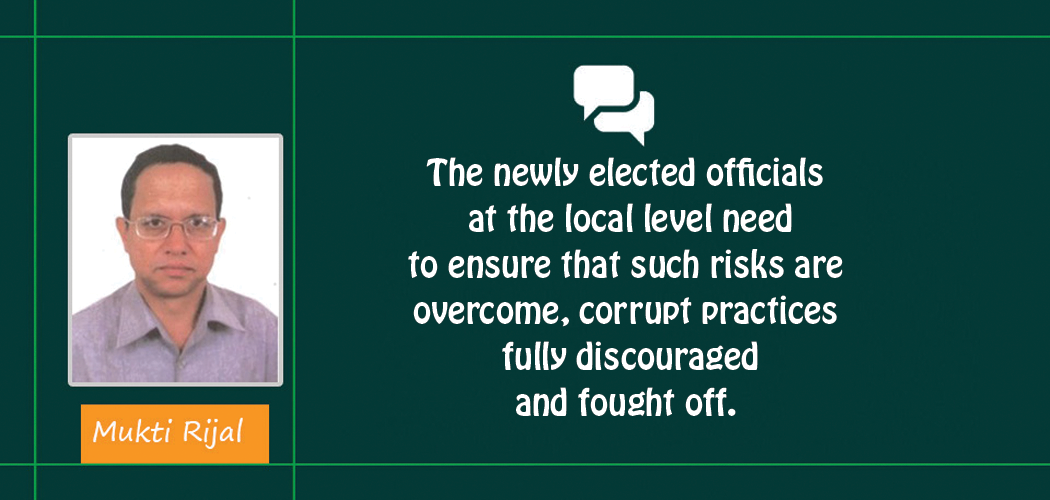- Friday, 20 February 2026
Local Governance Agenda
Mukti Rijal
The local election held recently has imparted a fresh lease of life into the body politic of local democracy in Nepal. It has given rise to new bursts of optimism and hope for democratic renewal and rejuvenation of democratic institutions in the country. The election has helped in maturing democratic process, and set a strong basis for political socialisation and citizen mobilisation. The election results have challenged the political parties which do keep guarding zealously the traditional pattern of organisation ethos and leadership. The results generate the message that the parties can lose their relevance and meaning should they fail to attend and respond to the needs and aspirations of the people in an accountable and democratic way.
Convincing message
The emphatic victory of the independent candidates such as Balendra Shah in Kathmandu Metropolis, Gopal Hamal in Dhangadhi Sub-metropolis, Harka Sampang Rai in Dharan Sub-metropolis and so on indicates that the voters can rise above the partisan alignment and throw their full weight behind the candidates who have a convincing message for delivery and demonstrate their commitment to integrity and accountability. Another strong indication that can be peeled off from the election results is that people no longer vote along the geographical and ethnic divide, and they seem to be more interested in governance and development agenda than in the ethnic and communal cleavages as harped by the political leaders time and again.
The voters in Kathmandu and Birgunj have strongly reposed their trust more in the agenda and merit of the candidates less on their ethnic and communal backgrounds. Moreover, the results have also confirmed that the local government executives who failed to perform and deliver to meet the minimum expectations of the people were badly beaten in the polls. According the preliminary analysis of the local election results, around 60-70 per cent local government executives who made their repeated attempt to return to the posts they held for the last five years failed to get elected because of their poor performance and delivery record.
In fact, the local government leaders running the municipalities and rural municipalities during the previous tenure had been alleged to be lured into corrupt practices and irregularities. A study conducted by the Commission for Investigation of Abuse of Authority (CIAA), not very long back, had shown that municipalities and rural municipalities have degenerated into one of the corrupt institutions in the country. A big horde of complaints indicting the local government leaders directly or indirectly had been registered with the CIAA during the previous fiscal years. This establishes that governance practices at the local level had become weak.
Following the first local elections held in 2017 after a gap of around 20 years, it was largely expected that elected representatives would become accountable and governance would improve in a meaningful way. But the spate of the cases of irregularities and corrupt practices did not decline and poor governance at the local level could not be improved. The elected representatives in some cases became so arrogant and errant that there was a persistent tendency to breach laws and rules with impunity, of course, in complicity of the bureaucracy.
Some local governments had been reported to be spending money in projects which had not been discussed and endorsed by the local assembly. Not only the equalisation grants but conditional grants provided by the Centre had also been misused at many local government units. However, these allegations leveled against the local governments had been brushed aside by the local government authorities time and again.
It must be thus admitted that there are several public finance management-related challenges and risks, including fiscal indiscipline at the local level. Though financial laws and regulations are enacted to enforce fiscal discipline, they are not fully complied and followed. The annual reports of the Office of the Auditor General in the last few fiscal years have reported widespread financial irregularities and leaks.
An analysis of the budget data showed poor prioritisation of projects and programmes leading to spending in non-prioritised areas and sectors. Also, several projects had been listed under priority projects and were considered and approved more on political grounds than on strategic importance. Moreover, poor internal control and weak enforcement of corrective measures against irregularities constitute the challenges to aggravate fiduciary and corruption risks at the local level.
Capacity development
Given the substantial number of public finance management-related challenges and risks at the local level, the newly elected officials at the local level need to ensure that such risks are overcome, corrupt practices fully discouraged and fought off. Besides the measures to enforce fiscal discipline, there is a need to build capacity of local governments both at the organisational and individual levels. Such capacity development actions need to be carried out upon thorough assessment of the needs, obligations and expectations. The present government in its policy and programmes and budget statement announced lately has talked at length about the programmes for capacity development of local governments. But such initiatives should be designed in such way that they were demand-driven and result-oriented.
Likewise, as articulated by the government time and again, there is a need for digitisation of the public finance management system, including the information and asset management systems to reduce the risks of irregularities and wasteful expenditure of resources. In addition to it, local citizens should also be substantively encouraged to have a meaningful space to engage with local government though hearings, audits and consultations to set local governance and development agenda and to seek accountability and responsiveness from the local authorities.
(The author is presently associated with Policy Research Institute (PRI) as a senior research fellow. rijalmukti@gmail.com)















